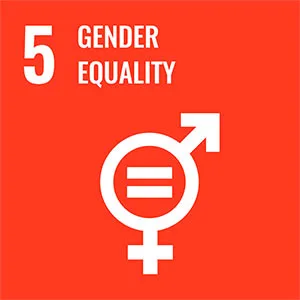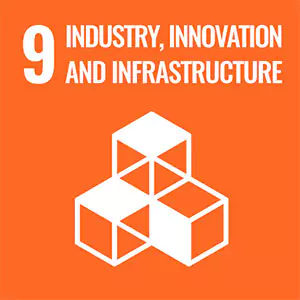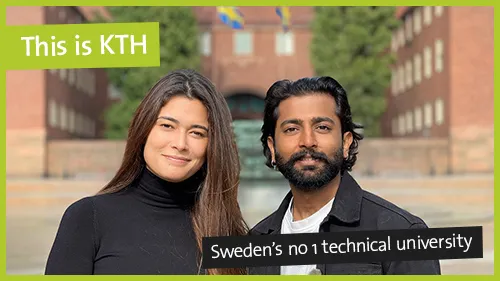MSc Molecular Techniques in Life Science
The joint master's programme in Molecular Techniques in Life Science prepares graduates for a professional research career in life science. It has a strong focus on molecular techniques for disease therapies and diagnostic tools, coupled with substantial training in data analysis (bioinformatics and programming). The programme is a collaboration between Karolinska Institutet, KTH and Stockholm University at the Science for Life Laboratory in Stockholm, offering students the unique opportunity to study at all three institutions.

Molecular Techniques in Life Science at KTH
Our understanding of biology at a molecular level has improved significantly in recent years, thanks to the rapid technological advancements in molecular techniques used across all areas of life science. This has led to the development of new therapies and diagnostic tools for the effective treatment of diseases, as well as novel insights into complex cellular processes at the molecular level.
Through the master's programme in Molecular Techniques in Life Science, you will receive a comprehensive education in life science. The programme emphasises cutting-edge methods in bioinformatic analysis of molecular data, including learning how to programme, combined with state-of-the-art techniques used in modern "high-throughput" molecular biology.
The programme is delivered by a team of teachers who are internationally recognised researchers within their respective disciplines, ensuring a relevant curriculum at the research forefront. There is a strong focus on high-throughput biology and data analysis, including biostatistics, programming, and the translation of biological findings from the lab bench to the patient bedside. The programme also develops skills and abilities essential to a professional career. These skills and abilities include oral and written presentation, teamwork, and making ethical and societal considerations about life science-related issues - , all essential competencies when leading projects in academia and industry.
This is a two-year programme (120 ECTS credits) in English. Graduates are awarded the degree of Master of Science. The programme leads to a joint degree from Karolinska Institutet, Stockholm University and KTH, issued by KTH.
Degree project
In the last semester of the programme, you will carry out a degree project. The research topic will be related to a subject in the curriculum. You will perform the project either in a research group at Karolinska Institutet, KTH, Stockholm University, Science for Life Laboratory, another internationally recognised university or research institute, or within industry. In recent years, students have, amongst other institutions, carried out their projects at Harvard Medical School and the University of Oxford. Examples of previous degree project topics are:
- Molecular mechanisms of exercise effects on cancer.
- Use of conditional Generative Adversarial Networks (GANS) for introducing lesions to mammogram data of healthy individuals.
- Cryo-EM identification of plant cytosolic ribosome-associated protein.
- Modulation of B cell autoimmunity in experimental Myasthenia gravis with tolerogenic nanoparticles.
- Exploring adipose tissue through spatial ATAC sequencing
Courses in the programme
The courses in the programme cover topics such as bioinformatics, genomics, proteomics, molecular life science methods, programming, biostatistics, translational medicine.
Courses in the programme Molecular Techniques in Life Science
Future and career
The combination of molecular biology, biotechnology, medicine, and data analysis provides an excellent profile for a professional research career, whether in an academic setting or the biotechnological and pharmaceutical industry. The life science sector is expanding worldwide, opening many possible employment opportunities for students. KTH also has an active alumni association connecting current students with graduates from the programme.
Sustainable development
Graduates from KTH have the knowledge and tools for moving society in a more sustainable direction, as sustainable development is an integral part of all programmes. The three key sustainable development goals addressed by the master's programme in Molecular Techniques in Life Science are:



After graduating from the master's programme, you will be equipped to contribute to UN Goals #3 Good Health and Well-being and #9 Industry, Innovation and Infrastructure (subgoal 9.5 - Enhance scientific research) since the programme focuses on training students to understand, use, and develop molecular techniques for disease therapies and diagnostic tools, with the aim of translating biological discoveries into medicine. This may also include conditions primarily affecting women and developing countries, hence addressing UN Goal #5 Gender Equality.
Faculty and research
Karolinska Institutet
, KI, is Sweden’s largest medical and biomedicine education and research institution. It is ranked as one of the top universities within its field and placed 49th amongst all universities in the THE World University Rankings 2025. KI teachers engaged in courses within the programme are all active researchers in basic or clinical research.
Stockholm University hosts one of the largest faculties of science in Sweden, and the programme’s teachers are active researchers in bioinformatics, biophysics, biochemistry, and molecular biology. The Stockholm University faculty at the Science for Life Laboratory has developed several widely used research tools, including projects such as,
Pfam
Pcons
, and
GROMACS
.
The School of Engineering Sciences in Chemistry, Biotechnology and Health (at KTH) hosts strong research groups affiliated with the programme within for example gene technology, bioinformatics, and proteomics. In particular, the School of Engineering Sciences in Chemistry, Biotechnology and Health is the home of Spatial Transcriptomics and the Human Protein Atlas projects.







